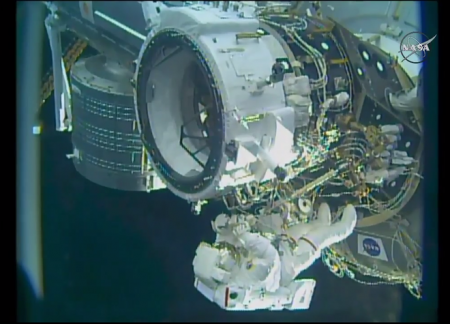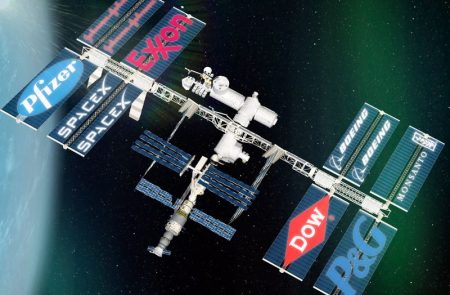August 21, 2016 – On Friday two American astronauts performed a spacewalk to install the International Docking Adapter delivered to the International Space Station (ISS) by a recent SpaceX supply mission. The new docking port provides a global standard that will be able to be used by commercial carriers as well as capsules launched by ISS partners. This is the first of two that will become part of ISS.

With NASA no longer focused on launch to low-Earth orbit, having signed up commercial partners and the Russians to be service providers to ISS, is it the next logical step for the American space agency to sell its interest in the station? That seems to be the scuttlebutt and speculation in the press the last few days.
Right now the space agency has committed funding for ISS operations until 2024. Russia is talking about pulling out of ISS even earlier than that date and recently proposed to reduce its permanent cosmonaut crew complement from three to two. Russia and China are talking about a joint space station venture as a replacement to their ISS commitment. So maybe this is the time for NASA to begin vetting private buyers for its share of ISS.
Beyond 2024 NASA is looking at a number of scenarios:
- Russia separating its modules from ISS to incorporate into a new space station.
- De-orbiting its portions to crash into the ocean.
- Selling modular parts piecemeal.
- Handing it over to private companies to run as a commercial enterprise.
But Russia and NASA are not the sole partners of the ISS project. Japan, Europe and Canada have interests as well and contribute annually to its operation and maintenance. So any sale or commercialization will have to take into consideration these partners as well.
It is more than feasible to consider commercial operators taking over the station. For a number of years NASA has involved private enterprise in its low-Earth orbit missions. Giving these companies an already built space platform would accelerate the commercialization of near-Earth space providing sustainable private business opportunity with a leg up.
NASA has put together a request for information to solicit ideas from commercial vendors for the future use of ISS and low-Earth orbit space. With the more than $100 billion in sunken costs covered by 15 years of ongoing research on ISS, the station has proven itself as a quality research and development platform. It would be a perfect test bed for private enterprise to help perfect space technology for more ambitious missions.
So who would be the buyers? Or would they even be asked to put any money down? The likely private operators based on those companies currently involved in the commercialization of space are Boeing and SpaceX. But I wouldn’t rule out others such as Lockheed-Martin, Blue Origin, Orbital Sciences, Sierra Nevada and Bigelow Aerospace. These companies may even propose a consortium to take over the servicing and managing of ISS for the period beyond 2024. Or they may even make an offer before that deadline date giving NASA an opportunity to free up funding for its deeper space ambitions.
Stephanie Davidson’s illustration of ISS below plastered with commercial signage may not turn out to be a fantasy after all. And you can imagine someone selling naming rights to ISS. Could we end up with a “The Trump ISS Hotel” should the man become the American president?











